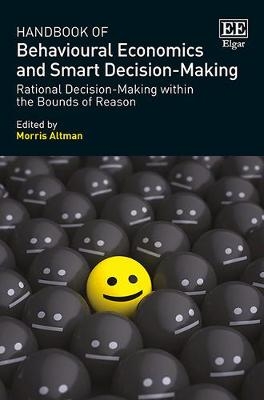
Handbook of Behavioural Economics and Smart Decision-Making
Edward Elgar Publishing Ltd (Verlag)
978-1-78254-957-4 (ISBN)
This comprehensive and original Handbook will appeal to academics in behavioural and experimental economics, and economic psychology.
Contributors include: M. Altman, C.L. Anderson, G. Antonides, M. Augier, S. Austen, N. Berg, P. Biscaye, P.J. Boettke, S. Bourgeois-Gironde, R.A. Candela, A. Cronholm, G. Danese, G. Foster, R. Frantz, P. Frijters, K. Gangl, H. Gintis, M.J.J. Handgraaf, B. Harrison, B. Hartl, A. Hopfensitz, S. James, B. Kamleitner, E.L. Khalil, R. Kheirandish, D. Kilger, E. Kirchler, F. Kutzner, D. Lester, A. Leung, E. McPhail, B. Meder, T. Mengay, L. Mittone, S. Mousavi, H. Neth, A. Ortmann, M. Pingle, O. Powell, O. Rosin, T.F. Rötheli, N. Sari, N. Shestakova, L. Spiliopoulos, V. Tarko, S. Teraji, J.F. Tomer, J. van Beek, T. Vogel, B. Yang Lester
Edited by Morris Altman, Dean, University of Dundee School of Business (UDSB), Chair Professor of Behavioural and Institutional Economics, and Co-operatives, Dundee, Scotland, UK
Contents:
Foreword by Vernon Smith
1. Introduction to Smart Decision-Making
Morris Altman
PART I Smart Decision-Makers, Different Types of Rationality, and Outcomes
2. Rational Inefficiency: Smart Thinking, Bounded Rationality, and the Scientific Basis for Economic Failure and Success
Morris Altman
3. Rational Mistakes That Make Us Smart
Nathan Berg
4. Rational Choice As If the Choosers Were Human
Peter J. Boettke and Rosolino A. Candela
5. Smart Predictions From Wrong Data: The Case of Ecological Correlations
Florian Kutzner and Tobias Vogel
6. Heuristics: fast, frugal, and smart
Shabnam Mousavi, Björn Meder, Hansjörg Neth and Reza Kheirandish
7. The Beauty of Simplicity? (Simple) Heuristics and the Opportunities Yet to be Realized
Andreas Ortmann and Leonidas Spiliopoulos
8. Smart Persons and Human Development: The Missing Ingredient in Behavioral Economics
John F. Tomer
PART II Aspects of Smart Decision-MakinG
9. Behavioral Strategy at the Frontline: Insights and Inspirations from the US Marine Corps
Mie Augier
10. Feminist economics for smart behavioural economics
Siobhan Austen
11. How regret Moves Individual and Collective Choices Towards Rationality
Sacha Bourgeois-Gironde
12. Is it rational to be in love?
Paul Frijters and Gigi Foster
13. Behavioural Economic Anthropology
Giuseppe Danese and Luigi Mittone
PART III Development and Governance
14. Do Changes in Farmers’ Seed Traits Align with Climate Change? A Case Study of Maize in Chiapas, México
C. Leigh Anderson, Andrew Cronholm and Pierre Biscaye
15. Rationality, Globalization, and X-Efficiency Among Financial Institutions
Roger Frantz
16. The Evolution of Governance Structures in a Polycentric System
Edward McPhail and Vlad Tarko
PART IV Tax Behaviour
17. Taxation and Nudging
Simon James
18. Income Tax Compliance
Erich Kirchler, Barbara Hartl and Katharina Gangl
PART V Smart Macroeconomics and Finance
19. Financial decisions in the household
Bernadette Kamleitner, Till Mengay and Erich Kirchler
20. Employing Priming to Shed Light on Financial Decision-making Processes
Doron Kilger
21. Experimental Asset Markets: Behaviour and Bubbles
Owen Powell and Natalia Shestakova
22. To Consume or to Save: Are We Maximising or What?
Tobias F. Rötheli
PART VI Dimensions of Health
23. Time orientation effects on health behaviour
Jannette van Beek, Michel J.J. Handgraaf and Gerrit Antonides
24. Behavioral aspects of obesity
Odelia Rosin
25. Time inconsistent preferences in intertemporal choices for physical activity & weight loss: Evidence from Canadian health surveys
Nazmi Sari
26. Suicide Amongst Smart People
Bijou Yang and David Lester
PART VII Sociological Dimensions of Smart Decision-Making
27. Seeing and knowing others: the impact of social ties on economic interactions
Astrid Hopfensitz
28. Weakness of Will and Stiffness of Will: How far are Shirking, Slackening, Favoritism, Spoiling of Children, and Pornography from Obsessive-Compulsive Behavior?
Elias L. Khalil
29. The Role of Identity, Personal and Social Capital in Community Crime Prevention
Ambrose Leung and Brandon Harrison
30. Norms, Culture, and Cognition
Shinji Teraji
PART VIII Morals and Ethics
31. Rational Choice in Public and Private Spheres
Herbert Gintis
32. Ethics and Simple Games
Mark Pingle
Index
| Erscheinungsdatum | 30.06.2017 |
|---|---|
| Verlagsort | Cheltenham |
| Sprache | englisch |
| Maße | 169 x 244 mm |
| Themenwelt | Geisteswissenschaften ► Psychologie ► Verhaltenstherapie |
| Wirtschaft ► Volkswirtschaftslehre ► Mikroökonomie | |
| ISBN-10 | 1-78254-957-9 / 1782549579 |
| ISBN-13 | 978-1-78254-957-4 / 9781782549574 |
| Zustand | Neuware |
| Haben Sie eine Frage zum Produkt? |
aus dem Bereich


